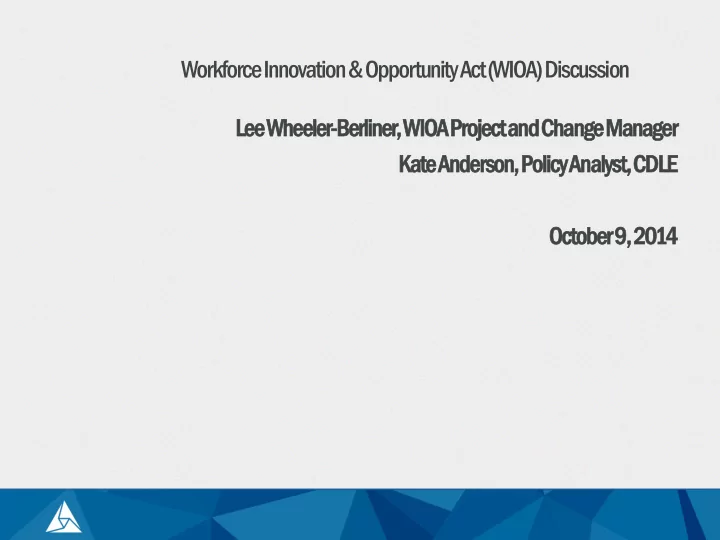

Workforce Innovation & Opportunity Act (WIOA) Discussion Le Lee W Wheeler-Berl rliner, W , WIOA P Proj oject a and Chang hange Mana anager Kate A e Ander erson, P Policy cy Analyst, CDL CDLE Octobe ber 9, 9, 20 2014
The he BHA HAG of of WIO IOA “…provide workforce investment activities that increase employment, retention, and earnings of participants, and increase attainment of postsecondary credentials, and as a result, improve the quality of the workforce, reduce welfare dependency, increase economic self- sufficiency, meet the skill requirements of employers and enhanc nhance the pr produ ductivit ity and d competi titi tiveness of th the Na Natio tion.”
What It Actuall lly Means • Real Partnerships – Across Core Programs in CDLE, CDHS, CDE – Local/Regional, Sectors • Employer Engagement • Beyond Jobs – Career pathways with credentials and good wages • Focus on those with Barriers to Employment
Timel eline • January 18, 2015—Draft regulations • Jul uly 1, , 20 2015—Start of fir irst t Pr Program Ye Year – New w functi tions s begin • January 22, 2016—Final regulations • March 3, 2016—State Unified Plans Due • July 1, 2016—Start of second Program Year
Timel eline • One in-person meeting prior to first Pr Program Year (March 19-20, 2015) • Total of six days of in-person meetings prior to deadline for new state Unified Plan (March 3, 2016)
Read adiness
Chan hanges • State Board Membership • Planning • State Board Functions • Local Board Membership/Certification • Regions and Areas • Alignment of Guiding Documents • Youth Council – State Policy Metrics • – Bylaws • Funding
CWDC Membership
CWDC Membership
CWDC Membership
Small ll Group p Conversatio ions • Group number is on your name tags • Find your group and circle the chairs
State e Board Responsibiliti ties es • NEW FUNCTIONS: – Review – Strategize – Disseminate
State e Board Responsibiliti ties es • What is surprising about the new functions? • What concerns do you have about performing these functions? • What should be kept in mind as new processes are developed? • How big of a change do you feel this is?
Region ons • WIOA requires defined “Planning Regions” and “Local Areas” – “Workforce Region” is now “Local Area” • Local Areas are now required to jointly plan for the Region • Units of Government may request designation as a Local Area and will seek the CWDC’s recommendation to the Governor
Region ons • What concerns you about these changes? • Which regions and sub-regions will be most impacted? How? • What should be kept in mind as a process and criteria are developed for region designation? • How big of a change do you feel this is?
Youth Co Council • Local Youth Councils permissible but no longer required • 75% of funding must be used for out-of-school youth • 20% of funding for work-based learning
Youth Co Council • What are your reactions to these changes? • Will they be difficult to implement in your region? Why or why not? • What role will the State Youth Council play in assisting local regions with changes? • How big of a change do you feel this is?
Metri trics • Percentage in unsubsidized employment (employment) • Median earnings of participants in unsubsidized employment (earnings)
Metri trics • Percentage who obtain a recognized postsecondary credential (attainment) • Percentage who are achieving measurable skill gains toward a credential or employment (attainment)
Metri trics What other metrics are worthwhile for the state to track? Effectiveness of serving employers • National indicator will be developed • What tools and indicators could help measure this?
Communicating g the Change ge • Council Members – Connect to the local regions and communities, and – Coordinate information to the regions they represent • Based on today, what are your needs? • What questions would you like researched? • What do you want to communicate to USDOL?
Next S t Steps ps • Work Groups • Resources
Lee ee Wh Wheeler eeler-Berlin erliner er, WIOA Project and Change Manager lee.wheeler-berliner@state.co.us 303-318-8223
Recommend
More recommend